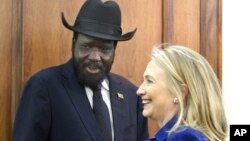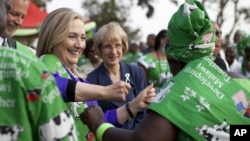KAMPALA, Uganda — Bolstering regional security was high on the agenda. U.S. Secretary of State Hillary Clinton traveled Friday to South Sudan and Uganda.
In a key diplomatic moment of her 10-day African tour, Clinton urged South Sudanese President Silva Kiir to make progress in ongoing negotiations between his country and its former rulers to the North.
A dispute over oil has brought the countries to the brink of war.
Clinton expressed support for what she said was South Sudan's "proactive" peace proposal last week, which would raise the oil-transit fees Juba pays to Sudan, and also transfer $3.2 billion to compensate Khartoum for the oil reserves it lost when South Sudan became an independent nation last year.
Stalled oil production harms both nations
South Sudan has faced criticism for its decision to shut down oil production entirely in January over the dispute with Sudan. The move has endangered both countries' economies, which depend on oil.
Clinton said the U.S. understands that South Sudan needed to take a stand, but now it is time to move forward.
"You've made a strong, irrefutable point about your rights to your resources, and now we need to get those resources flowing again, so that you can benefit from what is the natural treasure of South Sudan," she said.
Since January, South Sudan's inflation rate has risen to nearly 80 percent, and the country is running out of cash.
The U.S. helped broker the 2005 peace deal that ended the continent's longest running civil war, and since then Washington has been "heavily invested" in the success of the fledgling country.
However, South Sudan and Sudan have not been able to agree on issues of oil transport and revenues, citizenship and border demarcation.
US pledges money for humanitarian efforts
Continued fighting in the Southern Kordofan and Blue Nile regions has displaced 200,000 people.In Juba, Clinton announced Friday that the United States will spend an additional $15 million on humanitarian relief in the country.
She visited Juba just one day after a deadline for the two countries to either reach a deal or face U.N. sanctions. The warning was issued after the two sides fought along their border in April, raising fears of all-out war.
Both sides, Clinton said, must compromise.
"The oil shutdown and the refugee crisis both point to an inescapable fact: While South Sudan and Sudan have become separate states, their fortunes remain inextricably linked," she said. "The promise of prosperity rests on the prospects of peace. And South Sudan's ability to attract trade and investment depends on greater security on both sides of the border."
Clinton visits Uganda
After leaving Juba, Clinton traveled to Uganda, which she praised as a key U.S. partner in regional security, both for its leadership role in the African Union force in Somalia confronting the al-Qaida-linked extremist group al-Shabab, and for its efforts to capture Joseph Kony, leader of the Lord's Resistance Army, which has terrorized Uganda and its neighbors since 1986.
The U.S. has sent about 100 military advisers to central Africa to help Ugandan-led forces hunt down Kony. Clinton got an update on those efforts from U.S. and Ugandan military officials following a meeting with President Yoweri Museveni.
She also watched a demonstration of small, backpack-sized surveillance drones that the U.S. has sent to Ugandan forces for use against al-Shabab. Clinton quipped that if the drones could penetrate dense forest vegetation, they also could be used to track the elusive Kony.
Later, at a health clinic in Kampala, Clinton expressed concern over the rise in Uganda's HIV infection rate - from 6.4 percent in 2005 to 7.3 percent in 2011. That is a disappointing statistic for the country that was once considered a leader in the fight against HIV/AIDS.
"I am here because I am worried. In recent years, the focus on prevention has faded and new infections are on the rise again. Uganda is now the only country in sub-Saharan Africa where the rate of HIV is going up instead of going down," said Clinton.
She pledged an additional $25 million in funding for HIV/AIDS work in Uganda - in particular, to wipe out mother-to-child transmission of the virus.
Clinton continues her African tour with stops in Kenya and Malawi before she heads to South Africa early next week.
Map of African Countries Hillary Clinton will visit
View Clinton's Africa trip in a larger map
In a key diplomatic moment of her 10-day African tour, Clinton urged South Sudanese President Silva Kiir to make progress in ongoing negotiations between his country and its former rulers to the North.
A dispute over oil has brought the countries to the brink of war.
Clinton expressed support for what she said was South Sudan's "proactive" peace proposal last week, which would raise the oil-transit fees Juba pays to Sudan, and also transfer $3.2 billion to compensate Khartoum for the oil reserves it lost when South Sudan became an independent nation last year.
Stalled oil production harms both nations
South Sudan has faced criticism for its decision to shut down oil production entirely in January over the dispute with Sudan. The move has endangered both countries' economies, which depend on oil.
Clinton said the U.S. understands that South Sudan needed to take a stand, but now it is time to move forward.
"You've made a strong, irrefutable point about your rights to your resources, and now we need to get those resources flowing again, so that you can benefit from what is the natural treasure of South Sudan," she said.
Since January, South Sudan's inflation rate has risen to nearly 80 percent, and the country is running out of cash.
The U.S. helped broker the 2005 peace deal that ended the continent's longest running civil war, and since then Washington has been "heavily invested" in the success of the fledgling country.
However, South Sudan and Sudan have not been able to agree on issues of oil transport and revenues, citizenship and border demarcation.
US pledges money for humanitarian efforts
Continued fighting in the Southern Kordofan and Blue Nile regions has displaced 200,000 people.In Juba, Clinton announced Friday that the United States will spend an additional $15 million on humanitarian relief in the country.
She visited Juba just one day after a deadline for the two countries to either reach a deal or face U.N. sanctions. The warning was issued after the two sides fought along their border in April, raising fears of all-out war.
Both sides, Clinton said, must compromise.
"The oil shutdown and the refugee crisis both point to an inescapable fact: While South Sudan and Sudan have become separate states, their fortunes remain inextricably linked," she said. "The promise of prosperity rests on the prospects of peace. And South Sudan's ability to attract trade and investment depends on greater security on both sides of the border."
Clinton visits Uganda
After leaving Juba, Clinton traveled to Uganda, which she praised as a key U.S. partner in regional security, both for its leadership role in the African Union force in Somalia confronting the al-Qaida-linked extremist group al-Shabab, and for its efforts to capture Joseph Kony, leader of the Lord's Resistance Army, which has terrorized Uganda and its neighbors since 1986.
The U.S. has sent about 100 military advisers to central Africa to help Ugandan-led forces hunt down Kony. Clinton got an update on those efforts from U.S. and Ugandan military officials following a meeting with President Yoweri Museveni.
She also watched a demonstration of small, backpack-sized surveillance drones that the U.S. has sent to Ugandan forces for use against al-Shabab. Clinton quipped that if the drones could penetrate dense forest vegetation, they also could be used to track the elusive Kony.
Later, at a health clinic in Kampala, Clinton expressed concern over the rise in Uganda's HIV infection rate - from 6.4 percent in 2005 to 7.3 percent in 2011. That is a disappointing statistic for the country that was once considered a leader in the fight against HIV/AIDS.
"I am here because I am worried. In recent years, the focus on prevention has faded and new infections are on the rise again. Uganda is now the only country in sub-Saharan Africa where the rate of HIV is going up instead of going down," said Clinton.
She pledged an additional $25 million in funding for HIV/AIDS work in Uganda - in particular, to wipe out mother-to-child transmission of the virus.
Clinton continues her African tour with stops in Kenya and Malawi before she heads to South Africa early next week.
Map of African Countries Hillary Clinton will visit
View Clinton's Africa trip in a larger map









